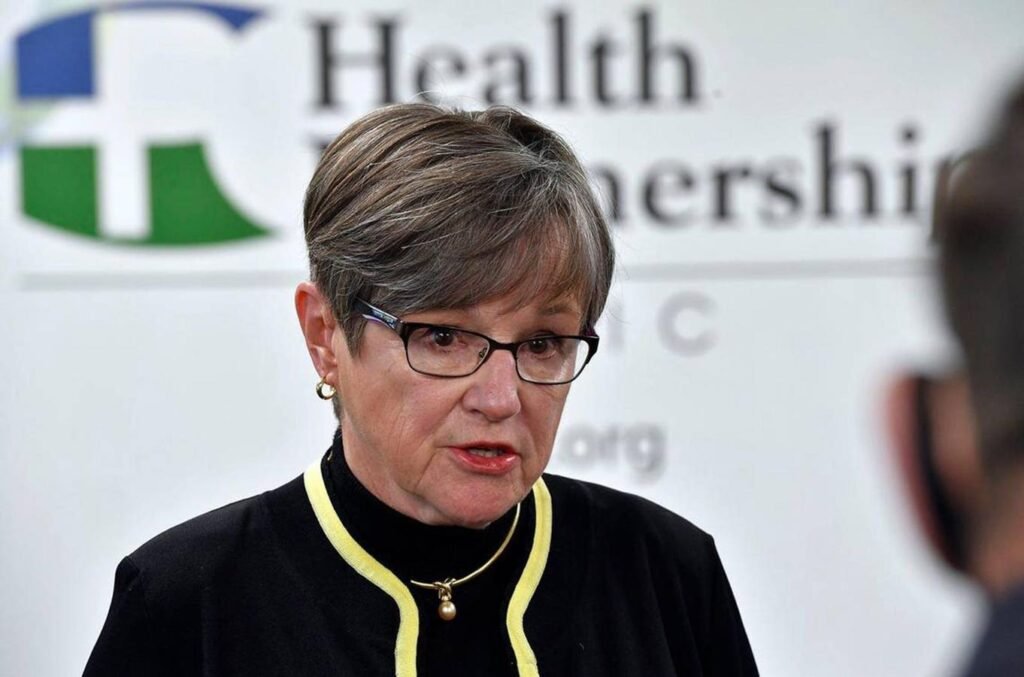This week’s edition of InnovationRx covers the spread of measles and disinformation, the DOJ targeting medical journals, HHS policy changes on Covid vaccines, and more. To receive it in your inbox, subscribe here.
Kansas Gov. Laura Kelly.
TNS
Over 624 cases of measles have been confirmed in Texas this year (as of Tuesday), with approximately 800 cases nationwide. Twenty-five states have reported cases, and the outbreak in Texas is genetically linked to spread in New Mexico and Kansas.
Not only is measles spreading, but so is misinformation about the disease, according to a recent survey from the Kaiser Family Foundation. Republicans appear to be more susceptible to this misinformation, with only one-third of Republican parents aware of the rise in measles cases compared to two-thirds of Democratic parents.
This misinformation hinders public health efforts as there is no approved treatment for measles, making vaccination the most effective way to control the disease. However, the survey revealed that a significant portion of Americans hold false beliefs about vaccines, such as linking them to autism or considering them more dangerous than the disease itself. HHS Secretary Robert F. Kennedy Jr. has been vocal in advocating some of these debunked beliefs.
In Kansas, 37 measles cases have been reported since mid-March. Governor Laura Kelly urged parents to vaccinate their children and pointed to the anti-vaccination movement as a contributing factor. She emphasized the importance of consulting with healthcare providers, gathering accurate information, and making informed decisions.
DOJ Targets Medical Journals For Political Leanings
Getty Images
In an unprecedented move, the Trump administration is investigating academic medical journals for perceived political biases.
CHEST, a peer-reviewed journal focusing on respiratory diseases and sleep medicine, received a letter from the U.S. Attorney General for the District of Columbia questioning its editorial stance and treatment of differing opinions. MedPage Today reported that at least three journals have received similar letters, with the New England Journal of Medicine confirming receipt of one. Editor-in-chief Dr. Eric Rubin affirmed the journal’s commitment to editorial independence and freedom of expression.
Learn more here.
BIOTECH AND PHARMA
HHS Secretary Robert F. Kennedy Jr. is considering withdrawing the recommendation for children to receive Covid-19 vaccines, as Politico reports. This decision could impact efforts to mitigate the disease’s effects on children, especially considering the prevalence of Long Covid and higher mortality rates compared to other respiratory illnesses like influenza. Meanwhile, several biotech companies developing next-generation Covid vaccines have received stop-work orders on federal contracts.
Additionally: Genentech has entered into an agreement with Repertoire Immune Medicines to develop treatments for autoimmune disease, with Repertoire receiving significant upfront and milestone payments.
DIGITAL HEALTH AND AI
Havas, a global communications firm, made a strategic investment in Ostro, an AI company for life sciences founded by Forbes 30 Under 30 alumni Chase Feiger and Ahmed Elsayyad. This investment is part of Havas’ larger commitment to AI and innovation, with Ostro having previously raised significant funds for its AI solutions in life sciences.
MEDTECH
China’s restrictions on rare earths not only impact electric vehicles but also pose challenges for medical equipment like MRI machines. These critical minerals are essential for various medical technologies, including diagnostic machines. Additionally, rare earths are used in healthcare for producing contrast fluids for diagnostic purposes.
Furthermore: Biolinq, a company specializing in biosensors for precision health, announced a $100 million series C funding round for advancing its biowearable platform.
PUBLIC HEALTH AND HOSPITALS
In Pennsylvania, Crozer Health hospitals are shutting down, affecting thousands of employees despite efforts to find a buyer. Meanwhile, the Providence health system, overseeing 51 hospitals in the western U.S., is halting non-clinical hiring due to economic challenges.
DEAL OF THE WEEK
Nourish, a telehealth platform connecting patients with registered dieticians, announced today a $70 million series B funding round to enhance its personalized nutrition services for patients with chronic diseases. Founded by Forbes 30 under 30 alumni, Nourish aims to provide tailored nutrition support for individuals managing chronic conditions, with plans to expand its dietician network and product offerings with the new funding.
WHAT WE’RE READING
New strategies to control “jumping genes” may offer new avenues for treating age-related diseases.
Ireland’s pharmaceutical industry faces uncertainty due to proposed tariffs by the Trump Administration.
Billions of healthcare funds have been frozen by the Trump Administration, causing delays in payments.
Tariffs imposed by the government could have significant financial impacts on hospitals nationwide.
The Supreme Court is divided on the provision of free preventive care under the Affordable Care Act.
The FDA has suspended quality control testing for dairy products following workforce reductions.
Streptomycin, an older antibiotic, shows potential as a treatment for metastatic cancer.
The NIH is discontinuing funding for the Women’s Health Initiative, a major research program in women’s health.
MORE FROM FORBES


